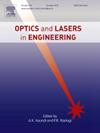使用单偏振相机快速完成穆勒矩阵偏振显微分析
IF 3.5
2区 工程技术
Q2 OPTICS
引用次数: 0
摘要
我们提出了一种用于完整穆勒矩阵成像的快速显微偏振计,使用两个旋转缓速器和一个偏振相机。我们的新设计使我们能够在 1.4 秒内通过 6 次测量计算出完整的穆勒矩阵。通过优化采样过程,采集时间得以缩短。同时,通过最小化测量矩阵的条件数、补偿像素位移和校准系统中每个偏振分量的方向,提高了测量精度。作为演示,我们使用快速偏振显微镜测量了石榴石样品和胆甾型液晶样品的完整穆勒矩阵。本文章由计算机程序翻译,如有差异,请以英文原文为准。
Fast complete Mueller matrix polarimetry microscopy using a single polarization camera
We propose a fast microscopic polarimeter for complete Mueller matrix imaging by using two rotating retarders and one polarization camera. Our new design allows us to compute the full Mueller matrix by 6 measurements in only ∼1.4s. The acquisition time is reduced by optimizing the sampling process. At the same time, the measurement precision is enhanced by minimizing the conditional numbers of the measurement matrices, compensating the pixel displacement, and calibrating the orientation of each polarization component in the system. As a demonstration, we use our fast polarimetry microscopy to measure the complete Mueller matrix for a garnet sample and cholesteric liquid crystal samples.
求助全文
通过发布文献求助,成功后即可免费获取论文全文。
去求助
来源期刊

Optics and Lasers in Engineering
工程技术-光学
CiteScore
8.90
自引率
8.70%
发文量
384
审稿时长
42 days
期刊介绍:
Optics and Lasers in Engineering aims at providing an international forum for the interchange of information on the development of optical techniques and laser technology in engineering. Emphasis is placed on contributions targeted at the practical use of methods and devices, the development and enhancement of solutions and new theoretical concepts for experimental methods.
Optics and Lasers in Engineering reflects the main areas in which optical methods are being used and developed for an engineering environment. Manuscripts should offer clear evidence of novelty and significance. Papers focusing on parameter optimization or computational issues are not suitable. Similarly, papers focussed on an application rather than the optical method fall outside the journal''s scope. The scope of the journal is defined to include the following:
-Optical Metrology-
Optical Methods for 3D visualization and virtual engineering-
Optical Techniques for Microsystems-
Imaging, Microscopy and Adaptive Optics-
Computational Imaging-
Laser methods in manufacturing-
Integrated optical and photonic sensors-
Optics and Photonics in Life Science-
Hyperspectral and spectroscopic methods-
Infrared and Terahertz techniques
 求助内容:
求助内容: 应助结果提醒方式:
应助结果提醒方式:


